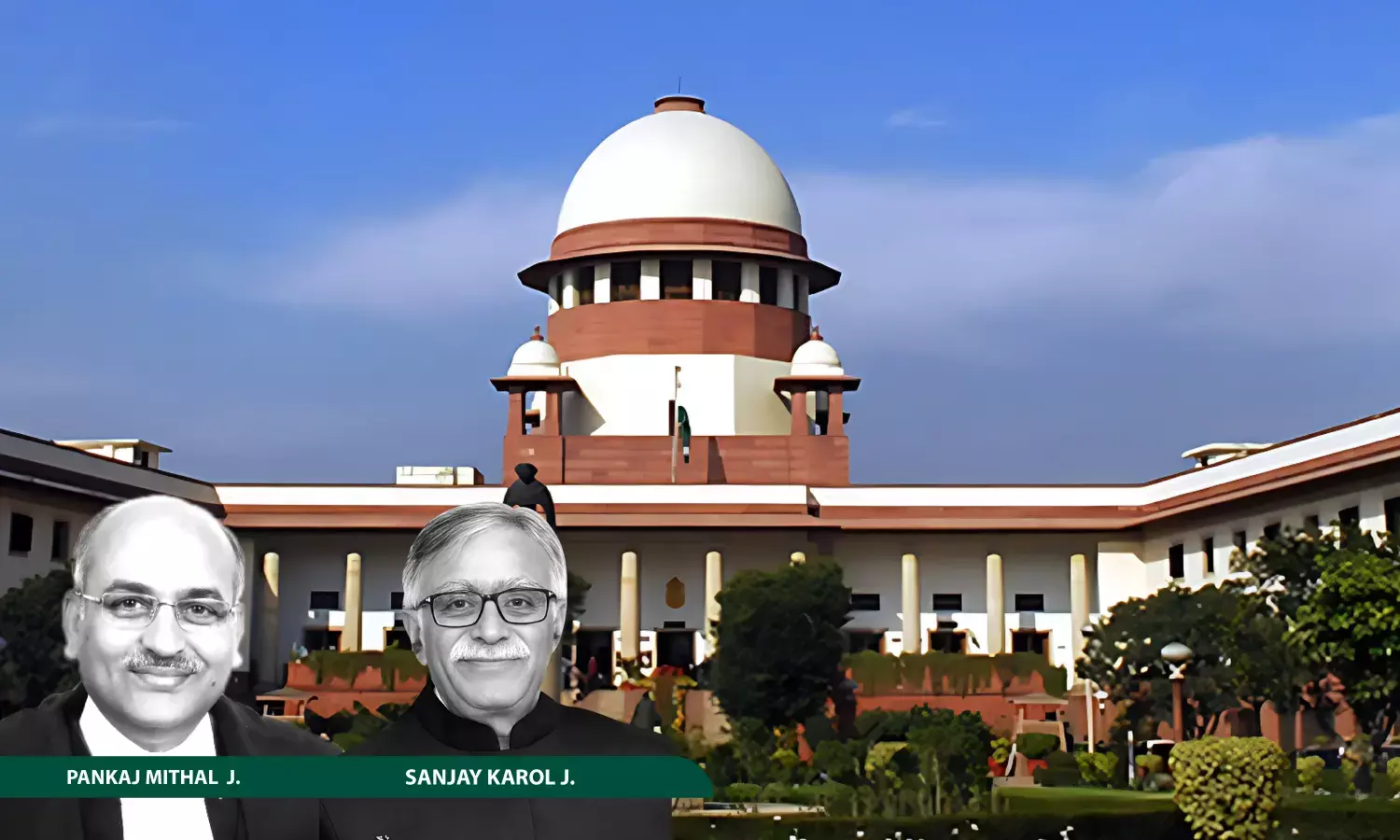Supreme Court: Once Probable Defence On Accused’s Part Is Established, Burden To Establish A Case Beyond A Reasonable Doubt Shifts Upon Complainant Under NI Act
The Supreme Court set aside the decision of the Karnataka High Court that had reversed the Order of acquittal under Section 138 of the NI Act.

Justice Pankaj Mithal, Justice Sanjay Karol, Supreme Court
The Supreme Court clarified that once the probable defence on the part of the accused has been established, the burden shifts upon the complainant to establish a case beyond a reasonable doubt under the NI Act.
The Court set aside the decision of the Karnataka High Court that convicted the Appellant under Section 138 of the Negotiable Instruments Act, 1881 (NI Act), and restored the Trial Court's original acquittal Order.
A Bench of Justice Pankaj Mithal and Justice Sanjay Karol held, “Considering the sum total of the above, we find that the probable defence on the part of the accused has been established. Once such a defence is established, the burden again shifts upon the complainant to now establish his case beyond a reasonable doubt, for after all, the effect of Section 138 of the N.I. Act is a criminal conviction.”
AOR Pai Amit appeared for the Appellant, while Advocte D. Bharat Kumar represented the Respondent.
Brief Facts
The Complainant claimed to have given a loan of Rs. 20,00,000 to the Appellant for producing a film, and in discharge of this loan, the Appellant issued a cheque that was later dishonored due to insufficient funds.
The Appellant, however, denied any liability, contending that the cheque was issued as a security instrument for a smaller loan of Rs. 3,50,000, which had already been settled. The Appellant also submitted that he had handed over two blank signed cheques as security and that the complainant had misused one of them.
Court’s Reasoning
The Supreme Court had to determine whether the Appellant had discharged the burden under Sections 118(a) and 139 of the NI Act. “Section 118 (a) assumes that every negotiable instrument is made or drawn for consideration, while Section 139 creates a presumption that the holder of a cheque has received the cheque in discharge of a debt or liability. Presumptions under both are rebuttable, meaning they can be rebutted by the accused by raising a probable defence,” the Bench stated.
The Court referred to its decision in Rangappa v. Sri Mohan (2010), wherein it was reiterated that “where the signature on the cheque is acknowledged, a presumption has to be raised that the cheque pertained to a legally enforceable debt or liability, however, this presumption is of a rebuttal nature and the onus is then on the accused to raise a probable defence.”
The Bench discussed the presumptions under the NI Act, stating that while Section 118(a) assumes that every negotiable instrument is made for consideration, Section 139 presumes that the holder of a cheque received it in discharge of a debt or liability. The Court emphasised that both presumptions are rebuttable.
The Court, based on the facts, stated that the “perusal of the record reveals the following aspects which constitute the accused’s probable defence” as “Both parties were friends and the money exchanged hands only as a hand loan; The movie, because of which the loan was allegedly taken, was produced, completed and exhibited many years prior to the cheque being presented for realisation, i.e., 2003 and 2008, respectively; The parties to the dispute entered into a Memorandum of Understanding dated 29th March 2008 which recorded that the accused took Rs.3,50,000/- and in payment thereof, the former gave, inclusive of interest, Rs.5,50,000/-”
“Keeping in view the above factors, it cannot be said that the complainant was able to discharge the burden once it had shifted back upon him, with the accused having discharged the burden of Sections 118 and 139 of the N.I. Act,” the Bench held.
Consequently, the Court ordered, “Consequent to the above discussion, we are of the view that the Trial Court was correct in recording a finding of acquittal in favour of the accused and reversal thereof by the High Court in terms of the impugned judgment, with particulars as in Para 1, was unjustified. As a result, the appeal is allowed…The judgment of the High Court is set aside, and that of the Trial Court is hereby restored.”
Accordingly, the Supreme Court allowed the Appeal.
Cause Title: N. Vijay Kumar v. Vishwanath Rao N. (Neutral Citation: 2025 INSC 537)
Appearance:
Appellant: AOR Pai Amit; Advocates Bhavana Duhoon, Pankhuri Bhardwaj, Nikhil Pahwa and Abhiyudaya Vats
Respondent: AOR Gopal Jha; Advocates D. Bharat Kumar, Aman Shukla and M. Chandrakanth Reddy

